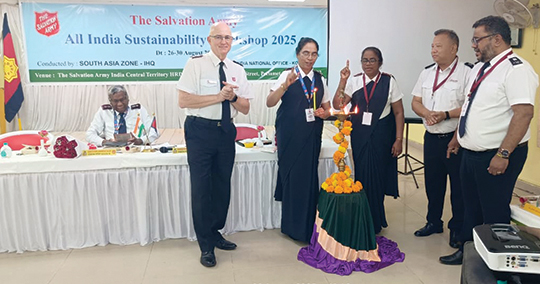From August 26 to 30, 2025, senior leaders from all six Salvation Army territories in India attended a sustainability workshop in Chennai, India. This included all territorial commanders and all chief secretaries, as well as all secretaries for business administration and at least one soldier/ non-executive director from all six Territorial Governance Boards. Joining them were staff from the National Office.

The workshop was facilitated by The Salvation Army’s South Asia Zone, with the International Secretaries of the zone, Commissioner John Kumar Dasari and Commissioner Mani Kumari Dasari, giving leadership throughout. The workshop faculty comprised Major Peter McGuigan, IHQ Secretary for Communications; leadership and management experts Dr Samuel Rao and Dr John Karunakaran; and audit specialist Mr Chandra Sekhar.
The workshop’s theme was ‘From Dependence to Independence’, a focus taking its lead from Compass, The Salvation Army’s new Global Strategic Framework, with its three touchstones of Empowering People, Enhancing Mission Impact and Establishing an Enduring Legacy. Spiritual, missional and financial / resources sustainability are key priorities being addressed by Compass.
It was acknowledged by all delegates that The Salvation Army in India is facing serious challenges that directly impact its ability to sustain the spiritual life of its people, the advancement of its mission, the stewardship of its financial and property resources, and its ability to align with the United Nations’ Sustainable Development Goals.
Challenges include the loss of registration imposed by Government (two territories have lost their registration, making it illegal to receive international funding among other restrictions); a groundswell of internal opposition to leadership decision making; in elective spiritual life development; a public relations risk involving reputation damage via social media trolling; a lack of capacity and confidence to conduct profitable relationships with senior officials in the government and business sectors as well as with individuals of high net worth in the private sector; and a lack of sophistication/skills required to navigate the contemporary business and statutory environment in India.
The workshop explored the development of sustainability pathways. Delegates workshopped vital subjects such as ‘The Call to Lead with Courage: Spiritual Sustainability in Restrictive Environments’, ‘A Theology of Mission-Driven Leadership:
Mission Sustainability, ‘Navigating Change from Dependency to Independence:
Understanding the Change Curve, ‘Releasing and Retaining Emerging Leaders:
Personnel Sustainability’, ‘From Scarcity to Abundance: Financial Innovation for Economic Sustainability’, ‘Creating a Culture of Generosity and Accountability:
Embedding Stewardship Values’, ‘Communicating Vision with Impact:
Embedding Effective Communication with Internal and External Supporters, ‘Emotional Intelligence and Resilience in Leadership’, and ‘Statutory Sustainability’.
STRATEGY EMERGING FROM WORKSHOP
Without exception, given the prominence and immediacy of the challenges being experienced by The Salvation Army in India, all delegates agreed that action needed to be taken urgently as a strategic way forward in addressing the challenges and creating a sustainable future: The strategy should be both Territorial level and the National level as well.
CONCLUSION
India is one of the largest economies in the world with enormous potential for The Salvation Army. It is also the country in the world with the second largest amount of Salvationists (Kenya being the country with the largest). According to the 2025 Salvation Army Year Book, we have more than 390,000 Salvationists in India (soldiers, junior soldiers and adherents). It’s a big reason to invest in our future in India rather than letting it slip into unchecked freefall.
Despite Hinduism being the largest and most practised religion in the country, there are great opportunities for us to build funding or in-kind partnerships through corporate social responsibility, globalisation and multinationalism with groups that do not exhibit religious bias. Similarly, the repurposing of property for lease.
Gone are the days when we can do it alone. All over the world, we are seeing the benefit of working together, whether non-profit organisations with profitable organisations, charities with government agencies, or non-profits working with each other, we are proving that much greater work can be accomplished together. At the same time, we need to build the capacity of our people and territories in India to operate effectively in this very different world of the 2020s and see our life and mission flourish into the future – to see people, families and communities transformed through the love of Jesus and the power of the Spirit of God.
Reported by Major Kanakaratnam Kagitha, National Business Secretary for Company & Association and Education Secretary, India National Office






